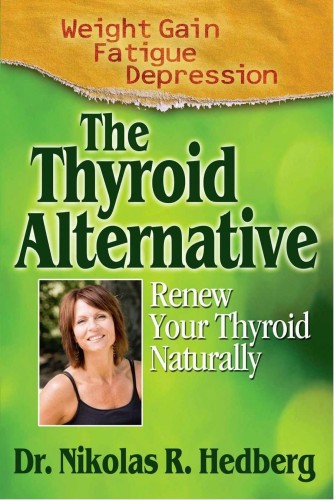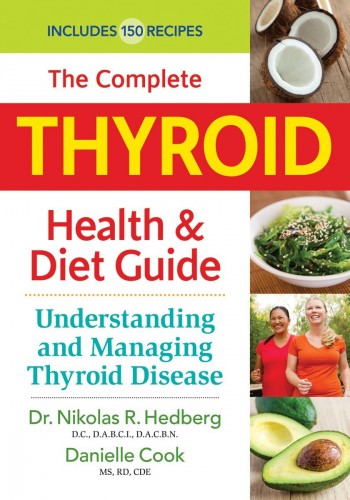
Dr. Nikolas Hedberg, Dr. Hedberg
Thyroid Nation
Dr. Hedberg discusses your sex hormones and the connection to your thyroid.
Testosterone
Testosterone is made in the testes and adrenal glands in a male, and in a woman, the ovaries and adrenal glands. Testosterone is very important for metabolism. It has been shown that low thyroid states result in low testosterone levels. When the thyroid gland returns to optimal function in individuals with challenged thyroids, their testosterone levels also return to normal. Testosterone replacement can help many conditions including thyroid and autoimmune diseases but simply giving these patients testosterone without correcting the reason why their testosterone is low in the first place does a great disservice to these patients in the long run.
Testosterone replacement suppresses the pituitary hormone that signals the testes to make testosterone. Once the patient comes off of the testosterone, one’s natural production may be suppressed resulting in dependence on the prescribing physician for continued hormone replacement. There are a variety of factors that must be addressed before prescribing testosterone which should be done as a last resort. It is very “sexy” in this day and age to get bioidentical hormones which are of course superior to synthetic hormones but still do not address underlying imbalances.
The following must be addressed before commencing testosterone replacement hormones:
- Liver detoxification
- Estrogen metabolism
- GI microflora activity
- Insulin sensitivity
- Adrenal function
- Testosterone synthesis
- 5-alpha reductase activity(converts testosterone into dihydrotestosterone)
- Beta-glucuronidase activity
- 17,20 lyase activity–progesterone to androstenedione
- Aromatase activity
- Hypothalamic-Pituitary feedback loops
Progesterone
Progesterone is mainly produced during the second half of a woman’s menstrual cycle. It is manufactured mainly in the ovaries and some in the adrenal glands in women. In men, it is made in the adrenals and testes. Progesterone enhances thyroid hormone function but a low thyroid can result in inadequate progesterone production. Like all other hormones, progesterone should not be used for long periods of time and should be used in minimal doses. Progesterone creams bypass the intestinal tract and liver which is more desirable than pills or sublingual drops. Many women use progesterone cream based on symptoms which many times does more harm than good. You should always have your hormone levels tested first before using hormone replacement. Synthetic progesterone known as Provera, Depo-Provera, etc. has been shown to increase the risk of breast cancer by 800%. Synthetic progesterone is not actually the progesterone that your body makes but a chemically-modified form of progesterone.
 Estrogen
Estrogen
Estrogen is made in the ovaries in cycling women but the majority of estrogen in a menopausal woman is made in the adrenal gland.
There are three types of estrogen hormones:
- Estrone or E1–10%
- Estradiol or E2–10%
- Estriol or E3–80%
The percentages indicate the amount that is naturally produced in the body. Synthetic estrogens are given in very high doses of estrone or estradiol with little to no amount of estriol throwing off the natural balance of estrogen in a woman’s body. This is one of the reasons why the Women’s Health Initiative was stopped before its completion due to the many side effects.
Estrogen is important for healthy bones, brain function, sex drive, and function and may have a protective effect from heart disease. As with any hormone, too much estrogen can have negative effects, especially an increased risk of breast cancer. We are living in an estrogen-dominant world due to the many chemicals that act like estrogen known as xenoestrogens.
Elevated estrogen can be due to stress, diet, exposure to xenoestrogens and impaired hormone detoxification systems. Stress will actually free inactive estrogen to active estrogen leading to side effects such as water retention, breast cysts, moodiness, and weight gain. Conventional meat from animals injected with estrogen can be a problem as well. The excess estrogen in the animals leads to weight gain from water retention increasing profits due to more money per pound. Fiber, liver detoxification, stress reduction and the elimination of conventional dairy and meat in the diet will lower excess estrogen.
We know that excess estrogen can lead to low thyroid function. The mechanism behind this is simply an inhibition of the conversion of inactive T4 into active T3 as well as estrogen binding to the proteins to which thyroid hormone would normally bind.
Women who are taking synthetic estrogens such as Premarin, Prempro and the birth control pill will most likely have low thyroid function due to the excess estrogen. Many times, cleansing the body of excess estrogen and ensuring proper estrogen metabolism in the liver can clear the symptoms of hypothyroidism.
It is a very rare case where we will use estrogen in our practice due to the fact that correcting underlying physiology can normalize estrogen levels. This is also true for post-menopausal women who usually have low estrogen due to concomitant adrenal fatigue. When the adrenal glands are healthy in a post-menopausal woman, she will usually have adequate estrogen in her system.
 Pregnenolone
Pregnenolone
Pregnenolone or “the mother of all hormones” is made from cholesterol mainly in the adrenal glands. As its name suggests, it is the precursor to all of your sex hormones including testosterone, estrogen, progesterone, DHEA and cortisol. Pregnenolone is found in its highest concentration in the brain and is important for memory and brain function. Research has shown that those with low thyroid function also have low pregnenolone levels. We use time-released pregnenolone in our patients with adrenal fatigue to rebuild the adrenal glands when they are exhausted. Most of the pregnenolone taken will convert into cortisol which is good if the adrenal glands are exhausted and not producing enough cortisol. Remember that too much cortisol inhibits thyroid function but on the flip side you need some cortisol to convert inactive T4 into active T3. Patients tend to notice an instant increase in energy and memory and have an improved sense of well-being once they begin taking pregnenolone.
DHEA
DHEA is a steroid hormone produced in the adrenal gland. There is plenty of research showing that patients with low DHEA levels also have low thyroid function. Like pregnenolone, DHEA is given to our patients who have adrenal fatigue to rebuild the adrenals. DHEA is not taken for long periods of time, however, as it can cause hormonal imbalances if not taken correctly. DHEA has its own effects on the body including proper immune function, fat burning, muscle building, tissue repair, proper liver function, and energy production. DHEA will also convert into other sex hormones such as estrogen and testosterone. When DHEA is given to a woman, it will most likely convert into testosterone but in a man, it will most likely convert into estrogen. DHEA received a lot of press as an anti-aging hormone which led to abuse of its over-the-counter availability. DHEA should not be taken without proper testing first and it should be taken in the lowest dose possible.
Cortisol
Cortisol is made in the adrenal gland to raise blood sugar into the normal range but chronic elevations of cortisol can lead to blood sugar problems. Cortisol in high doses is a catabolic hormone meaning it breaks down the body’s tissues. Cortisol also eats away at the area of the brain that is involved in memory known as the hippocampus. Cortisol is also required for an adequate immune response to infection so if you have trouble recovering from infections you may have inadequate adrenal gland function. Cortisol converts into cortisone which is your body’s natural anti-inflammatory. Too much cortisol will suppress TSH (thyroid-stimulating hormone), inhibit the conversion of inactive T4 into active T3 and also directly block thyroid hormone receptors. Cortisol is required, however, to convert inactive T4 into active T3 making it very important for proper thyroid hormone function.
The adrenal glands should nearly always be treated before the thyroid is treated due to the fact that too much thyroid hormone can make already fatigued adrenals even worse. I have also found that once the adrenals are functioning optimally, many patients’ thyroid symptoms resolve indicating it was not a thyroid problem in the first place.
**Original article featured on DrHedberg.com**
About the Author
 Nikolas R. Hedberg, D.C., D.A.B.C.I., D.A.C.B.N., B.C.N.P. Dr. Nikolas Hedberg and wanted to be a doctor since he was 5. That passion stayed with him through many years of education and private practice, helping patients get well from all over the world. The most exciting thing about practicing is the detective work that he gets to do with each patient, to uncover the causes of their health problems. There is nothing more rewarding than discovering what has been causing the health problems of someone who has been searching for answers and guiding them back to optimal health. He spend a great deal of time reading the latest scientific research so he can be on the cutting-edge of both conventional and alternative medicine. He believes that there is no single best form of medicine. He uses the best of all forms of medicine to help each patient, to the best of his abilities. No one should be treated as a lab test or in a “cookie-cutter” way. He practices “Functional Medicine” which is truly an individualized medicine that looks at all potential aspects of each patient’s unique health situation. Functional medicine looks at all the systems of the body as being connected without isolating a single organ or body system. He was drawn to the functional medicine model because it is so individualized and leaves no stones unturned. Read more about Dr. Hedberg, here. Follow him on Facebook, Twitter and Google+.
Nikolas R. Hedberg, D.C., D.A.B.C.I., D.A.C.B.N., B.C.N.P. Dr. Nikolas Hedberg and wanted to be a doctor since he was 5. That passion stayed with him through many years of education and private practice, helping patients get well from all over the world. The most exciting thing about practicing is the detective work that he gets to do with each patient, to uncover the causes of their health problems. There is nothing more rewarding than discovering what has been causing the health problems of someone who has been searching for answers and guiding them back to optimal health. He spend a great deal of time reading the latest scientific research so he can be on the cutting-edge of both conventional and alternative medicine. He believes that there is no single best form of medicine. He uses the best of all forms of medicine to help each patient, to the best of his abilities. No one should be treated as a lab test or in a “cookie-cutter” way. He practices “Functional Medicine” which is truly an individualized medicine that looks at all potential aspects of each patient’s unique health situation. Functional medicine looks at all the systems of the body as being connected without isolating a single organ or body system. He was drawn to the functional medicine model because it is so individualized and leaves no stones unturned. Read more about Dr. Hedberg, here. Follow him on Facebook, Twitter and Google+.
Questions or anything to ask Dr. Hedberg about your hormones? We want your thoughts in the comments section–Please!



